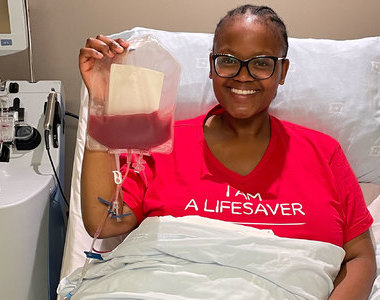Rising women scholars share their stories at faculty anniversary
06 July 2022 | Story Helen Swingler. Photos Nasief Manie. Voice Cwenga Koyana. Read time 9 min.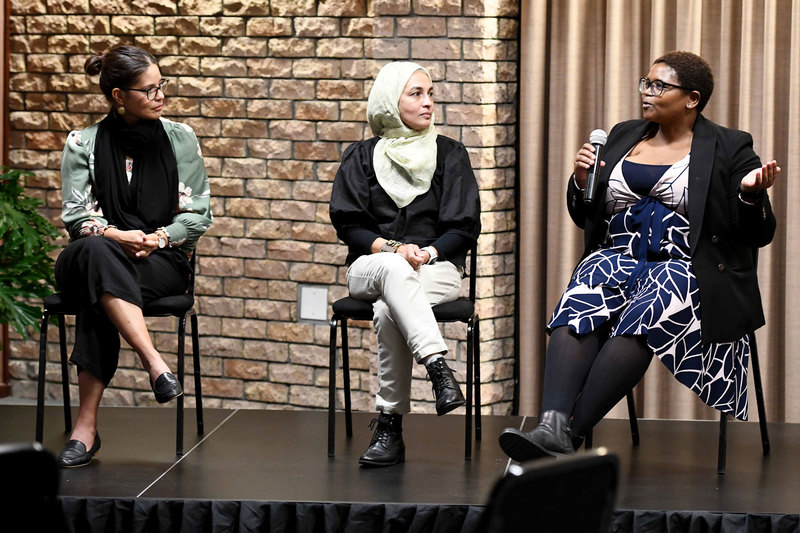
Back your work, don’t stand aside for male counterparts, budget carefully for your research projects, and change the narrative of self-belief. Sage advice from three leading women health sciences scholars, all part of the University of Cape Town’s (UCT) Research Leadership Programme.
The trio of Professor Roshan Galvaan, Dr Yumna Albertus and Associate Professor Phumla Sinxadi was speaking at the “Women of the Future” event to mark the Faculty of Health Sciences’ 110th anniversary. It was a platform to share their personal stories, advice and wish lists with other young women in research.
Spread across UCT’s faculties, the Research Leadership Programme aims to grow the cohort of leading women scholars who will lead the university’s research in the future. Deputy Vice-Chancellor for Research and Internationalisation Professor Sue Harrison heads the initiative.
While the programme targets research leadership, its approach is holistic, said Dr Yolande Harley, the faculty’s deputy dean for research and moderator at the event. The pilot programme will run for three years.
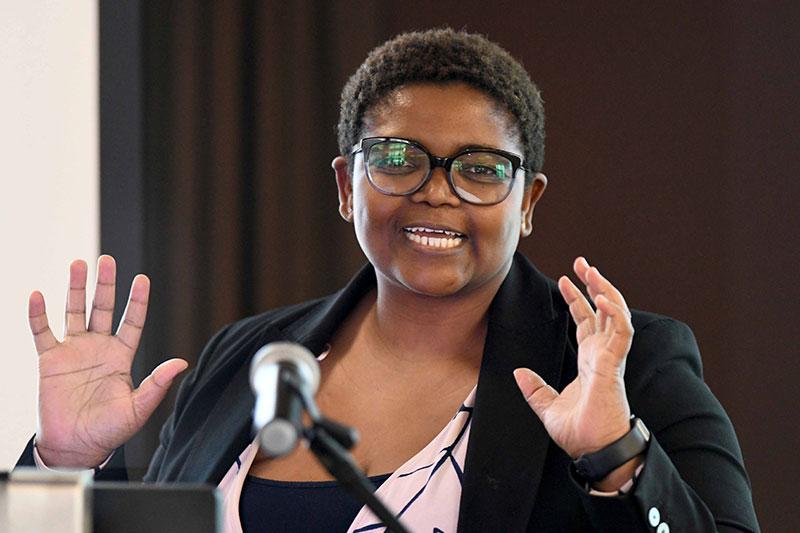
Perseverance, balance, dedication
The trio’s stories interwove common and individual experiences, touching on perseverance, barriers to women in academia, balancing family and work life, tips for emerging women researchers, and contributing to high-impact research.
“Everybody has a library of stories, a whole cabinet of stories that they tell, some tinged with pain and upset and violence.”
It’s important to hear these stories, said the dean of the Faculty of Health Sciences, Associate Professor Lionel Green-Thompson, in his introduction to the event. Women’s stories had been attenuated too often in the past.
“Everybody has a library of stories, a whole cabinet of stories that they tell, some tinged with pain and upset and violence.”
The anniversary was an opportunity to bring these stories to the fore in celebrating this rich history, he said.
The hybrid event was held in the faculty’s Frances Ames Room, renamed during Health Sciences’ centenary in 2012. The late Emeritus Associate Professor Frances Ames was a neurologist and human rights activist who put her career and safety on the line when she led the medical ethics inquiry into the death of Black Consciousness Movement leader Steve Biko in 1977. The actions – or inactions – of the district surgeon and a doctor who had treated Biko after his torture in prison were lambasted by members of the medical fraternity.
A young doctor at the time, Associate Professor Green-Thompson said he had been inspired by her bravery.
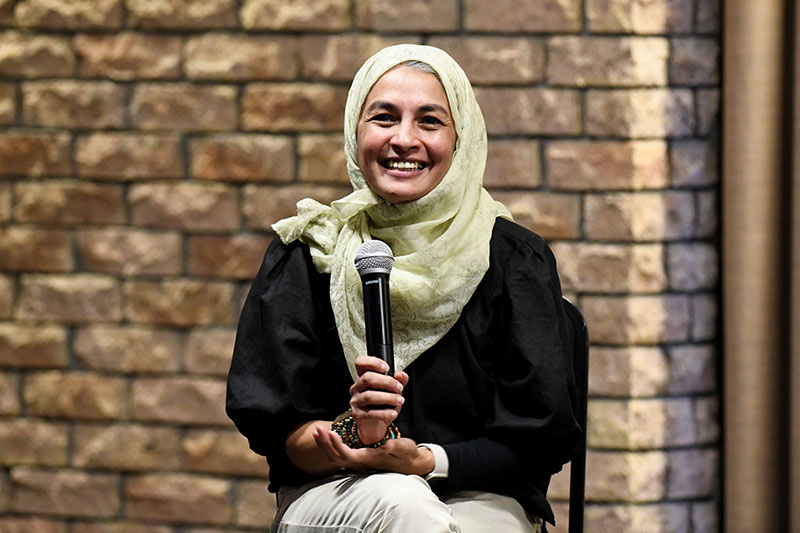
As a UCT News article at the time of Ames’ death in 2002 noted, “She and five colleagues brought a successful action against the powerful South African Medical and Dental Council, which put her own career, and safety, on the line. As a result, the SAMDC was compelled to set up an inquiry into the conduct of the doctors involved. She also testified before the Truth and Reconciliation Commission to this effect.”
Lauding Ames’ example, Green-Thompson said, “I come into this spirit of ancestry, this place of the stars, recognising that rich legacy that all of our ancestors have brought into this space.”
To the trio of researchers on the platform, he said, “I really want to thank you for being a part of the emerging story that is coming. I want to congratulate you. I hope that as you speak tonight, we begin to inspire a whole new way of thinking about the journeys of [women] researchers.”
Pioneers, innovators, role models
Associate Professor Sinxadi was an early pioneer. With her MMed at UCT in 2010 she became the first black South African clinical pharmacologist. Sinxadi now leads the Division of Clinical Pharmacology’s ’s pharmacogenomics group. She was also the lead investigator for the initial First-Into-Human phase I clinical trial for a novel antimalarial compound discovered at UCT.
Growing up in a women-led household, Sinxadi said her mother and grandmother had been her role models. Her grandmother, who had to leave school in Grade 6, was her champion.
“In the planning, don’t forget the financial side.”
“She was passionate about ensuring I got an education. Growing up, I was motivated mostly by my teachers,” Sinxadi said.
A PhD was not something she dreamt about, but the young Sinxadi was clearly meant for academia.
Her advice for young women researchers includes careful financial planning.
“In the planning, don’t forget the financial side. When I applied for my PhD scholarships abroad, I added the budget stating how much it was going to cost to live in the United States for six months. It’s important to budget properly.”
No ‘one’ way
Professor Galvaan heads the Department for Health and Rehabilitation Sciences. She came through the ranks via the Division of Occupational Therapy. She has led curriculum change in undergraduate and postgraduate teaching, promoting social justice through curriculum development within the university, nationally and internationally. Galvaan is the co-founder of the Inclusive Practices Africa, a research unit focusing on how disability inclusion drives change.
Galvaan has won the UCT Social Responsiveness Award twice: in 2015 for engaged scholarship, and in 2018 she was again a co-recipient for her contribution to UCT’s Schools Improvement Initiative.
Her advice to young women researchers is not to eschew a different, more feminist way of thinking about research.
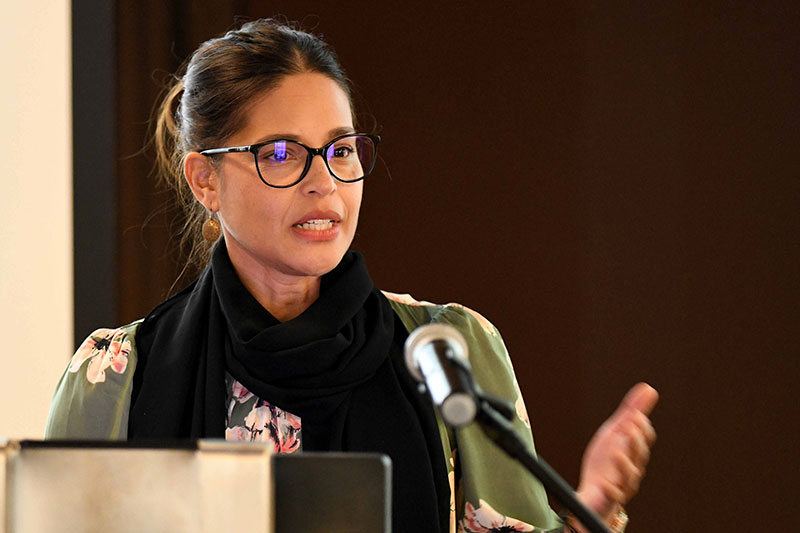
“There is no ‘one’ way of approaching research. It’s about caring for each other and opening up the [research] space for everyone,” she said. The culture of research would benefit from acknowledging the “different ways of doing research that are not lesser than”.
Confident in quality
Dr Albertus is a senior lecturer and emerging researcher in the Division of Physiological Sciences. She is one of the few sports scientists in South Africa working in rehabilitation, neurophysiology and biomechanics.
Her research has ranged from rehabilitation using robotic over-ground walking in spinal cord injury, exercise-based rehabilitation following cardiovascular disease, in elite para-athletes with cerebral palsy, and injury risk in running. Albertus uses innovative biomechanical technology to monitor neuromuscular changes over time.
Albertus and Associate Professor Amir Patel’s (mechatronics) have also produced two patents on low-cost force plates and inertial motion sensors. These technologies will improve the way biomechanics data are captured and allow these measurements to be taken outside the laboratory. (UCT spin-off company Acino Technology will be manufacturing these low-cost biomechanics devices.)
“It’s about changing our mindset: that we are the best; we are up there.”
She encourages young researchers to be confident about the quality of their work.
“We don't realise how good our research is. It's only when you attend international conferences that you really see that … It’s about changing our mindset: that we are the best; we are up there.”
A personal anecdote underscored this.
“I was telling my 13-year-old son that I had a Bangladeshi cricketer coming to my lab for tests on his bowling biomechanics. And he said, ‘But why to your lab? Surely he would be going to England or Australia?’ And I stopped the car and said, ‘What makes you think that my lab isn’t as good, or even better, than those in England and Australia? And what makes you think, at your young age, that we’re not as good or even better?’ But I was actually talking to my younger self when I said that.”
Women researchers could also learn from their male counterparts.
“They are unapologetic about what they do and how they go about their research. Whereas we, as women, always try to put others first.”
All three spoke of their struggles to balance family and work – and manage the heavy administrative loads that absorbed their time and creative energy.
On a question from the audience about assertive women being seen as manipulative or calculating, Galvaan said, “Be honest [with your colleagues] about the career paths you want to take. Find people you can trust who can give you honest feedback.”
 This work is licensed under a Creative Commons Attribution-NoDerivatives 4.0 International License.
This work is licensed under a Creative Commons Attribution-NoDerivatives 4.0 International License.
Please view the republishing articles page for more information.
Listen to the news
The stories in this selection include an audio recording for your listening convenience.




























































































